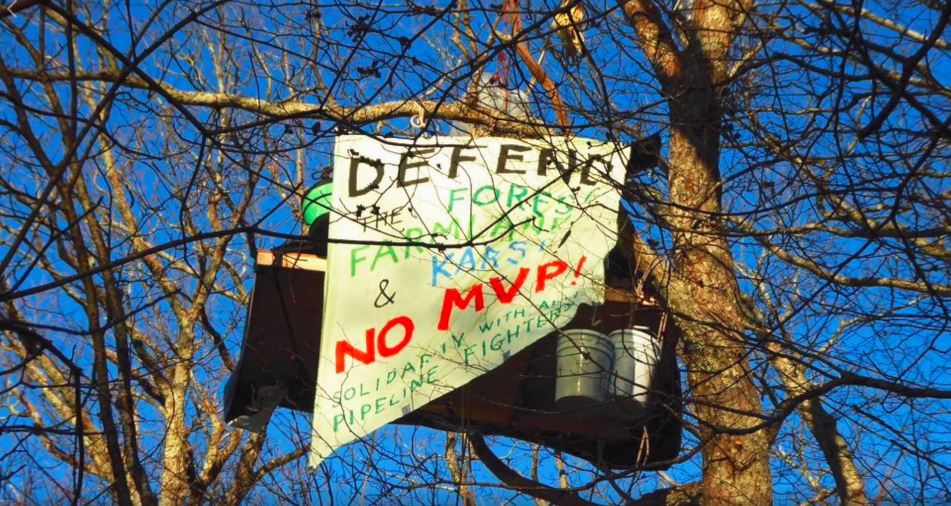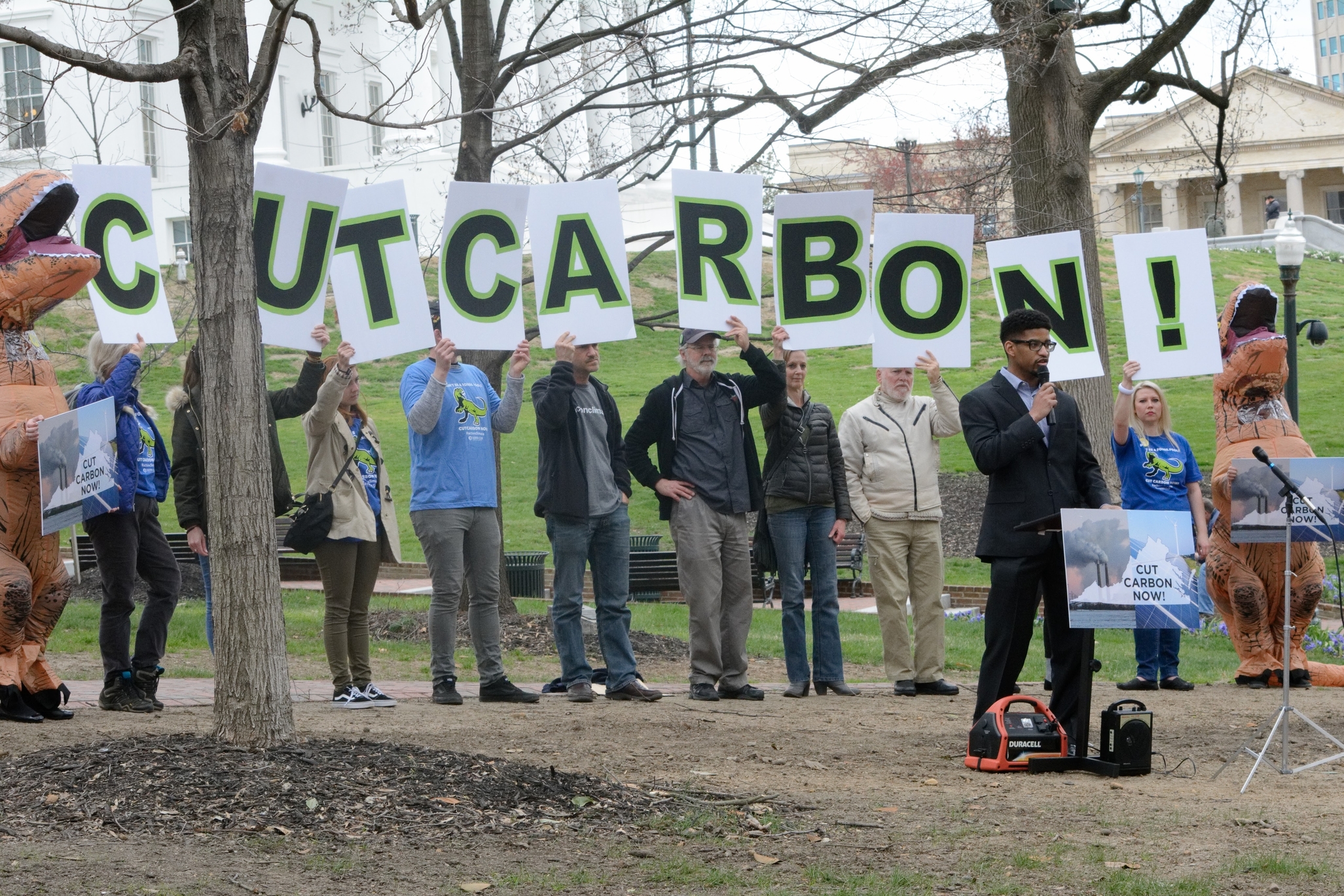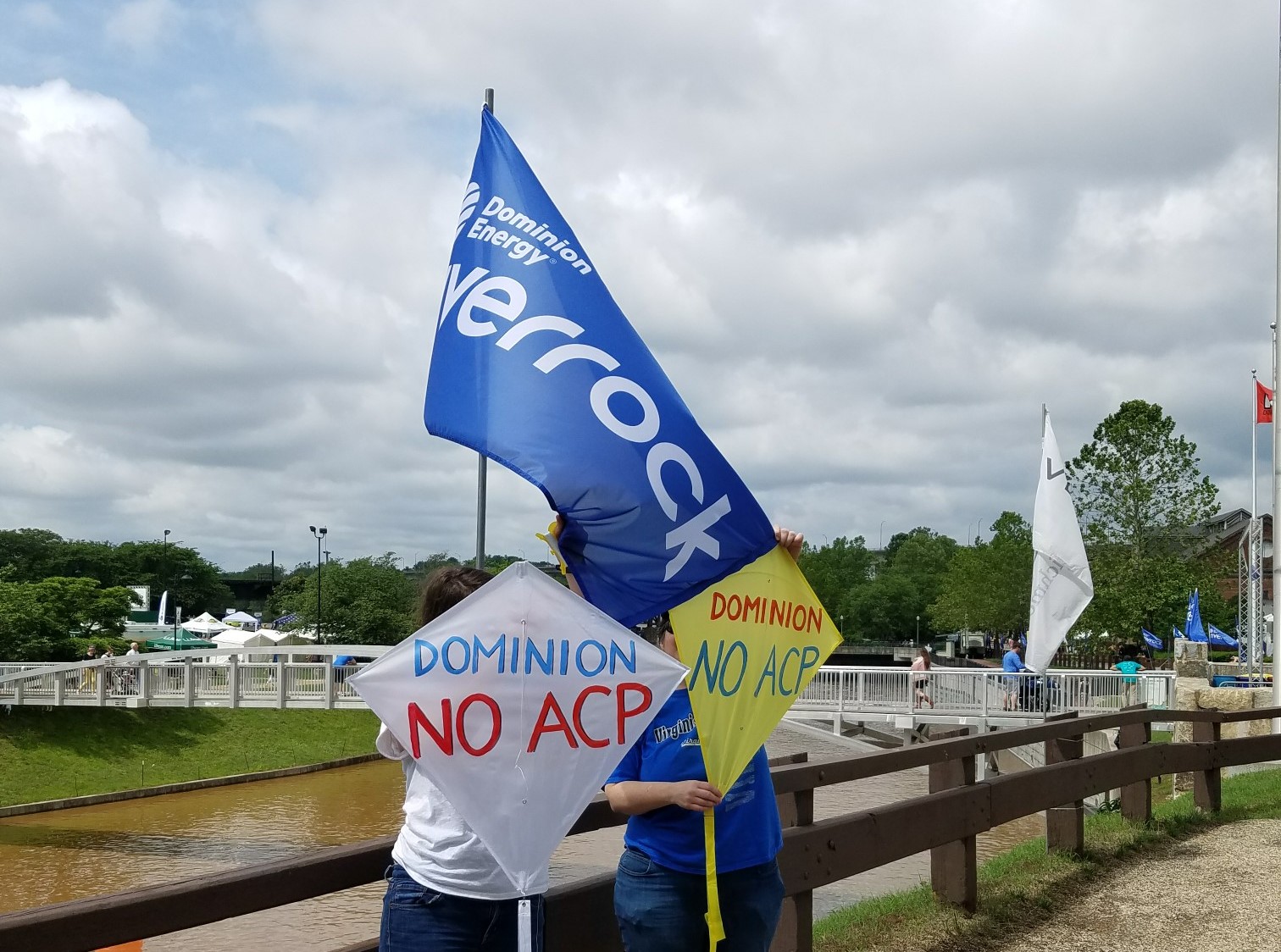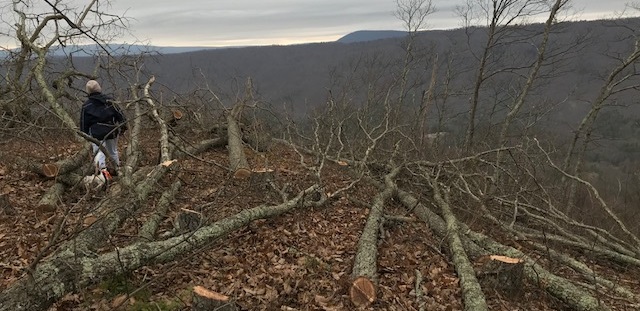In an age of rising seas and harmful pipelines, one thing is clear: Virginia needs strong climate action now.
To do so, CCAN is proposing that Virginia join the Regional Greenhouse Gas Initiative, or RGGI. This would be a bold move on climate in Virginia. One way to get there would be to pass statewide legislation, such as the Alternative Energy and Coastal Protection Act. But no matter how we get there, it’s worth laying out all the questions you may have.
What is the Regional Greenhouse Gas Initiative, anyway?
The Regional Greenhouse Gas Initiative (RGGI) is a market-based climate change plan that reduces harmful pollution from fossil-fuel power plants and makes polluters pay for their carbon emissions. There are currently nine East Coast states in the program that together set a “cap” on planet-warming fossil fuel emissions from power plants, which lowers each year. Then, they allow the power plants to “trade” pollution allowances however they see fit to keep total emissions under the cap from Maine to Maryland (thus the name “cap and trade.”)
It’s a flexible, market-based approach to reducing greenhouse gas emissions, and has proven effective in helping states cut carbon.
The auction also generates millions of dollars of revenue, which goes back to the states to fund additional carbon reduction programs and other public benefit initiatives decided by each state.
Virginia is currently in the drafting process of regulations that would allow us to partially engage in the program, but we still have more work to do — more on that below.
What is a pollution “allowance”?
An allowance represents one ton of carbon dioxide that is burned in a power plant within a RGGI state.
RGGI controls and reduces pollution by setting a number of allowances that are available to buy based off of each state’s cap and lowering that number each year. Then, power companies can bid on the allowances based off of what they need to provide power to their customers.
The regulated power plants can buy allowances from any state, but because there are a limited amount of them, the companies also look to other methods that don’t involve fossil fuels like energy efficiency and renewable energy to provide their customers with energy at a lower cost. The bidding for these allowances takes place at regional auctions four times per year.
What exactly is covered under RGGI?
Specifically, any power plant in a RGGI state that burns fossil fuels (coal or natural gas) with a capacity of 25 megawatts (MW) or greater is required to meet the climate pollution standards set by RGGI. More generally, this applies to large utility-owned power plants that provide energy for large numbers of people. They are called “regulated sources.”
These “regulated sources” are required to have their carbon dioxide (CO2) emissions monitored. They must also buy allowances for each ton of CO2 they plan to emit. Once RGGI sets a cap on the number of allowances available, polluters must figure out how to stay below the cap — either by paying more to pollute or by investing in energy efficiency and renewable energy.
I’ve heard that Virginia is already joining RGGI. What does that mean?
In November 2017, the Virginia State Air Pollution Control Board approved draft regulations to cap carbon emissions by linking with RGGI. “Linking” means that Virginia polluters will be able to trade within the RGGI market, but through a consignment auction — which means Virginia regulators themselves would give away allowances instead of selling them.
This means that Virginia regulators at the Department of Environmental Quality (DEQ) will have no say over where the revenue raised from these auctions will go. It also means that DEQ would give polluters their allotted allowances for free instead of buying them from the state. They would then be obligated to sell them back into the RGGI market and buy back what they need.
This process blocks Virginia (and its residents) from accessing the huge funding opportunities that other RGGI states currently enjoy. It also opens the possibility that polluters could actually make a profit off of the RGGI market if they buy back less pollution allowances than they sold.
Also, this “link” has an end date. It only permits Virginia’s participation in the program through the year 2030.
So why should Virginia formally join?
By formally joining RGGI, our elected Virginia officials would be able to access the millions of dollars in revenue to spend on programs that benefit the Virginia public — instead of lining the pockets of corporations.
As a formal member, state regulators at the Virginia DEQ would have the authority sell all of Virginia’s allowances to polluters — instead of giving them away for free — and invest the revenue (projected to be up to $200 million per year) in projects that would mitigate climate change and help the Commonwealth’s most vulnerable residents. This step would also place a long-term cap on carbon, guaranteeing that we’ll continue to lower carbon pollution past the year 2030.
How do we go about doing that?
Legislative action is required to formally join RGGI. We at the Chesapeake Climate Action Network have been advocating for this, most recently through a bill called the Virginia Alternative Energy and Coastal Protection Act (VCPA).
A bill like this would allow us to formally join the program and give DEQ full authority to make a carbon rule with much more long-term certainty.
Has RGGI effectively reduced carbon emissions?
Yes! RGGI has proven effective in helping states significantly reduce carbon emissions while bolstering their economies at the same time. In 2016, RGGI states emitted even less than the cap required — 8.4 percent less. Overall, emissions have fallen 40 percent since RGGI launched. The newest RGGI model rule will lead to an additional 30 percent reduction from current emissions by 2030 as well.
What will cutting carbon emissions mean for our health?
Virginia stands to gain huge benefits from RGGI that go far beyond climate impacts. By cleaning up our power plants, we would also cut down dangerous air pollutants like soot and smog alongside carbon. States that are currently in RGGI have already seen immense health benefits: air quality improvements have prevented at least 8,200 asthma attacks, 39,000 lost workdays, and 300 premature deaths. It is estimated that RGGI has provided these states $5.7 billion in public health benefits. Joining RGGI will not only provide long-term relief from climate change, but also immediate public health benefits to Virginia’s most vulnerable residents.
And what about our economy?
Joining RGGI would provide a huge economic boost to Virginia residents. The revenue Virginia would receive would be invested in energy efficiency and renewable energy programs that create jobs and help businesses. It would also help lower electric bills through investments in energy efficiency. Participation in RGGI has generated over $1.4 billion in economic activity for participating states in just the past three years. The program has also created over 44,000 jobs. Customers in those states have also saved money through energy efficiency improvements and by switching to cheaper renewable energy — $1.37 billion to be exact!
How could joining RGGI lead to more wind and solar power?
Formally joining RGGI would open up new funding to help solar and wind power companies. This crucial investment will help Virginia create jobs and catch up to neighboring states in the growing clean energy economy. Formally joining would also provide a permanent incentive for renewable energy sources, since they will not require a RGGI allowance and will thus gain a price advantage over dirty energy.
Currently, we are lagging far behind our neighbors in terms of renewable energy. Virginia only gets 0.5 percent of its energy from solar power — and we have yet to build a wind turbine bigger than the 10 kilowatt residential standard systems! Long-term investment in renewables and incentives like the RGGI market will help us increase those numbers astronomically.
Ok, let’s talk money. How much revenue would we be able to access?
It’s estimated that RGGI would bring up to $200 million in revenue to Virginia each year. This could lead to as much as $2 billion in new revenue by 2030 for projects that mitigate climate change and improve the livelihood of residents across the Commonwealth!
Wow! What could we do with all those proceeds?
With access to the revenue from RGGI, we couldd boost our economy, protect our most vulnerable communities, and lower energy bills for all Virginians.
In the bill that was discussed in this year’s General Assembly (the VCPA), proceeds would provide consistent funding for twenty-first century economic development in southwest Virginia — an area that is heavily reliant on the fossil fuel industry — leading to more capacity to aid families and train workers in the growing renewable energy job market.
It would also help protect Virginians from sea level rise by providing a reliable revenue stream for the Shoreline Resiliency Fund, a revolving fund created by the General Assembly in 2015 to help residents, businesses, and municipalities fund flooding resilience projects.
It would invest millions of dollars in energy efficiency — with a special focus on low-income communities — to help lower bills and use less energy in general.
Finally, it could provide millions of dollars to stabilize funding for agricultural “best management practices” (BMPs) that help farmers and protect the Chesapeake Bay.
But what about fracking? I’ve heard RGGI incentivizes fracked gas.
RGGI does NOT incentivize fracking. A significant switch to gas (beyond fuel switching already happening for non-RGGI reasons) is unlikely to be triggered by participation in this regional power plant cap-and-trade program.
This is because RGGI incentivizes zero-carbon sources of energy the most. With wind and solar energy more affordable, constructing new natural gas plants would be relatively more expensive than the status quo situation. As for the existing natural gas plants, these power plants are already operating at near maximum capacity and simply cannot absorb a significant increase in gas use, making a build out in renewables a better choice for the environment and for the polluters’ bottom lines.
Renewable energy is becoming more affordable and more of a priority in Virginia, as the amount of renewables in the public interest will increase tenfold to 5,000 MW this summer.
These three RGGI factors — a deterrent to the construction of new gas plants, a lack of capacity in Virginia of existing gas plants, and a clearer path to new renewable energy — mean that the state’s participation in the program would not promote an expansion of natural gas.
So, what is CCAN doing to stop fracked gas expansion?
CCAN has been working hard to end Virginia’s deadly addiction to fracked gas for years. Ever since the announcement of plans to build the Atlantic Coast Pipeline and Mountain Valley Pipeline, we have done everything we can to stop them. We continue to fight them to this day.
We also are planning to fight new fossil fuel projects in Virginia before they are even announced. We will do this through legislation and grassroots mobilization, under the banner of a “No New Fossil Fuels” pledge. Stay tuned.
In the end, our goal is to make sure that NO dangerous fracked-gas pipelines (current or future) will ever be operational, and our leaders will turn to renewable sources instead. Joining RGGI would make that all the more likely.
More information:

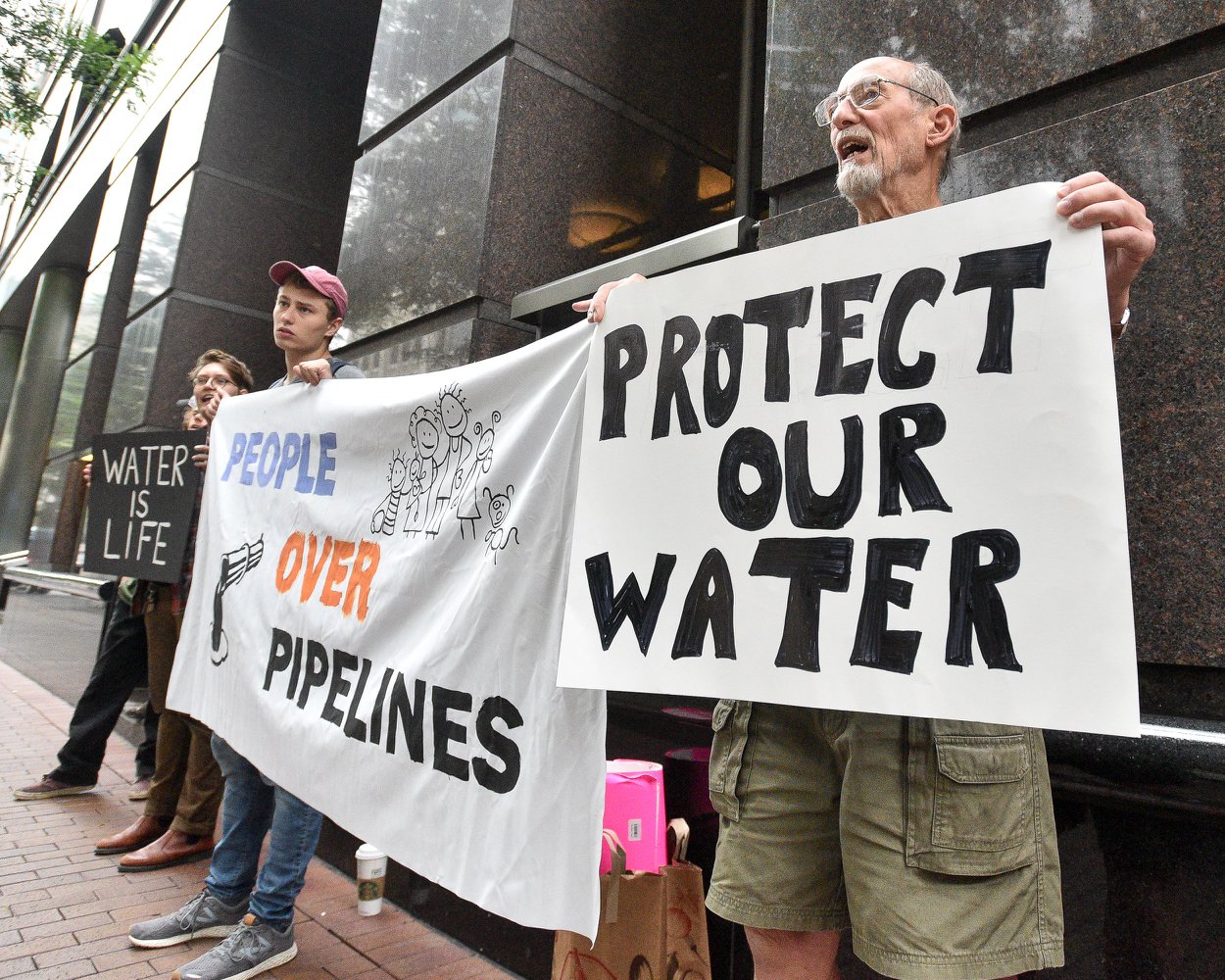

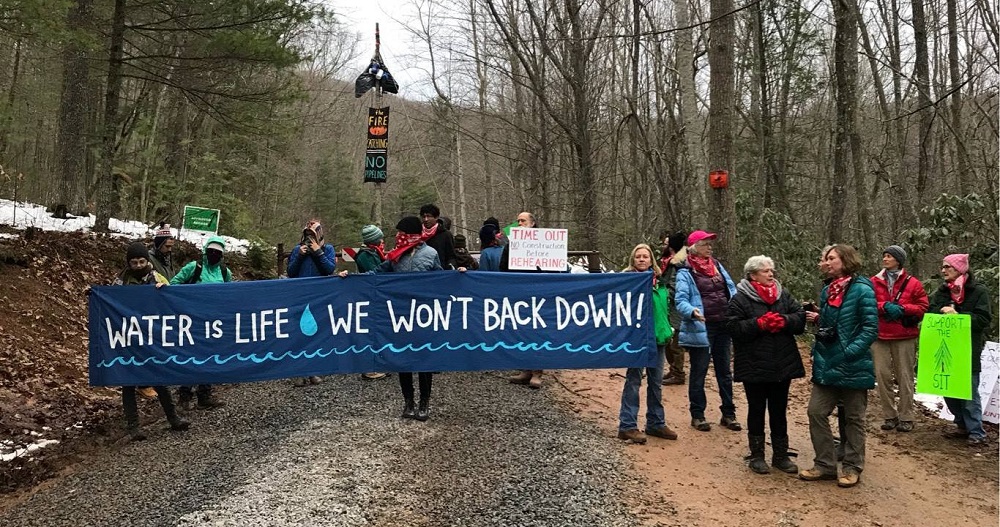
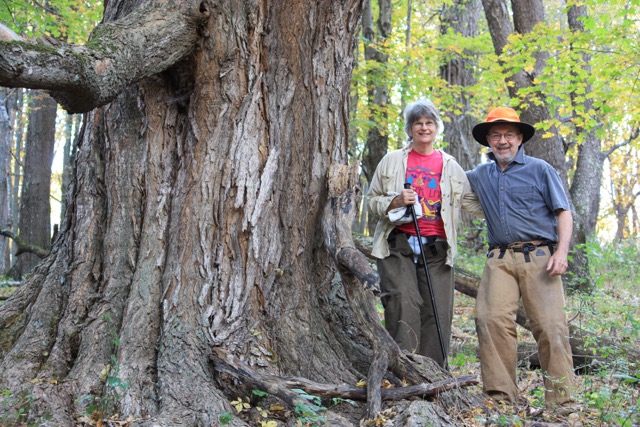


 more than a dozen Virginia Delegates and Senators to hold a press conference in Richmond to denounce the Atlantic Coast and Mountain Valley Pipelines. In May, she organized one of the most energetic Dominion shareholder protests in recent memory, getting landowners, elected officials, faith leaders, and even the famed tree-sitter Red Terry herself to come and speak to the impassioned crowd.
more than a dozen Virginia Delegates and Senators to hold a press conference in Richmond to denounce the Atlantic Coast and Mountain Valley Pipelines. In May, she organized one of the most energetic Dominion shareholder protests in recent memory, getting landowners, elected officials, faith leaders, and even the famed tree-sitter Red Terry herself to come and speak to the impassioned crowd. Your age: 53
Your age: 53
